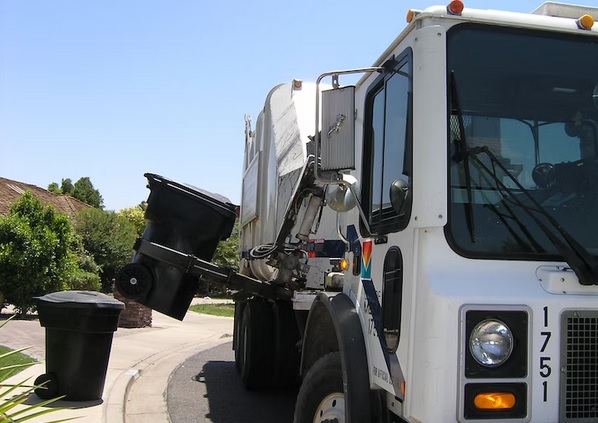Today, many people associate the word “monopoly” with big tech firms like Google and Amazon that crowd out competitors. They may be unaware that many other monopolies operate in local jurisdictions and are protected by Oregon law.
Water, sewage, electricity, natural gas, mass transit, and even waste hauling services are all provided by government-run or government-protected monopolies. Until recently, ride hailing services were supplied by a government-regulated cartel of taxi companies—until Uber and Lyft entered the market. Now, monopoly waste haulers face competition from a small start-up company named Ridwell, which identified gaps in Oregon’s trash collection system and is trying to succeed as a business by filling it.
By law, Oregon divides garbage and recycling hauling into territories served by contracts with waste removal companies. Within each territory, companies that haven’t entered a contract are banned from picking up trash. It is believed that this approach keeps garbage collection simple and reduces traffic congestion by not having multiple trucks driving down the same street. State officials claim the system ensures that everyone in Oregon has access to garbage services at the same rate.
The problem with this system is the same as with any government-protected monopoly. Because consumers don’t have choices, firms have few incentives to innovate. When competitors bring innovation into the system, monopolists fight back to maintain their monopoly.
Ridwell was started in 2017 by Ryan Metzger and his son, who identified a gap in the garbage collection system. Items such as light bulbs, batteries, and plastic foam are difficult to recycle. These items are not allowed to be put into the standard recycling bins used by Oregon residents. Before Ridwell existed, residents would have to pack up their items and drive them to a specialty recycling center. The inconvenience and hassle are too much for most people, so these items usually end up in the trash. According to the company’s website, Metzger and his son started Ridwell as a “recycling carpool.” For a fee, they would drive around, collect batteries from neighbors, and bring them to specialty recycling centers. As more residents expressed interest, Ridwell continued to expand to more cities, including Portland.
Ridwell hit a roadblock in December 2021 when it expanded services into unincorporated parts of Washington County. The county banned Ridwell and started its own replacement program instead, called Recycle+. The Recycle+ program, launched July 1, is run by the waste removal companies currently under contract with the county. Recycle+ is an add-on program which customers can opt into for a fee. Recycle+ will accept some of the items currently handled by Ridwell. The contract haulers can pick up extra revenue doing this, and Ridwell is banned from competing against them.
For many customers, Recycle+ provides an inferior service. While Ridwell accepts styrofoam, Recycle+ does not. Ridwell says it offers more opportunities to reuse items, which generates less waste than recycling. In addition, the reach of Recycle+ is more limited than Ridwell’s. Recycle+ was created to serve only the urban areas of unincorporated Washington County, but the service is not available in many rural areas of the county. The program also will not be able to serve multi-family households initially but plans to do so later on. Ridwell already serves these residences.
Eight years ago, Uber was involved in its own battle with a government-supported monopoly. When Uber first came to Portland, it faced stiff resistance from the government and entrenched taxi companies. Portland issues permits to taxi drivers operating in the city. If a new taxi company started, it would have to apply for a permit and prove that Portland needed more taxis. Rather than put up with the red-tape and painfully slow City Hall process, Uber began operating. This led to a contentious legal battle; but in the end, Uber prevailed. Uber was so popular that the city was forced to let the company operate. To even the playing field a bit for existing taxi companies, Portland rolled back a few of its regulations. Specifically, it halted rules regulating how many taxis could operate at one time and how much they could charge. In the end, Portland consumers were better off. They now have more transportation options available and fewer rules to stifle competition.
Ridwell’s current conflict mirrors Uber’s battle. Ridwell is a small start-up that skirted many of the rules the county mandates its trash companies must follow. Unincorporated Washington County apparently did not learn from the Uber story, since it chose to keep all the current regulations and kick Ridwell out. If Uber has taught us anything, it is to provide options for consumers and let the market choose winners. Unincorporated Washington County should allow Ridwell and rival companies to operate. A variety of options from competing services means residents can pick and choose the most affordable and effective services.
James Swyter is a Research Associate at Cascade Policy Institute, Oregon’s free market public policy research organization.
Did you like this article? Contribute to Oregon’s premier public policy research organization online at CascadePolicy.org. Donations to Cascade Policy Institute are tax-deductible to the extent of the law.
Disclaimer: Articles featured on Oregon Report are the creation, responsibility and opinion of the authoring individual or organization which is featured at the top of every article.


